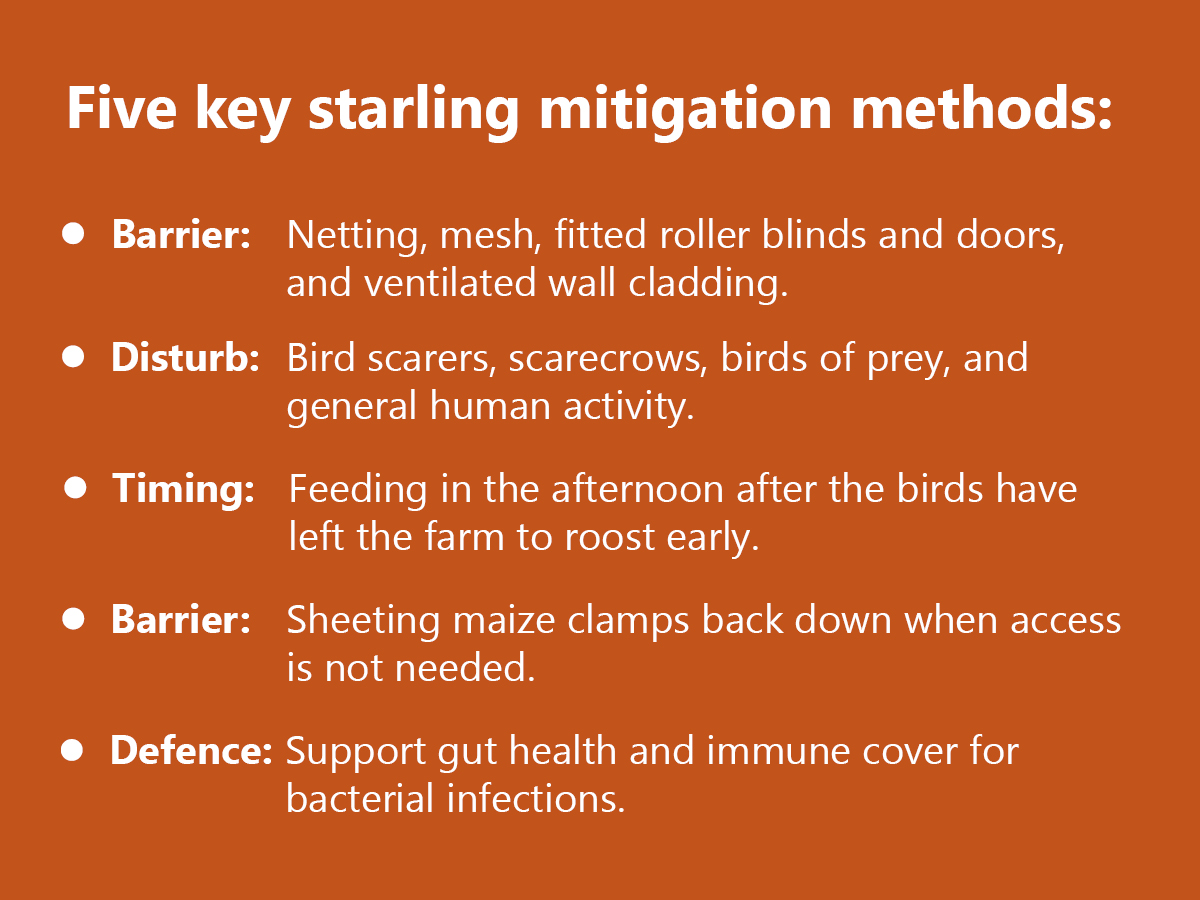Left-field approach to starling mitigation on dairy farm
Starlings can be a real pest on farm. Attracted by feed, water, and perching sites like trees and feed fences, they can consume and contaminate feed stocks to a significant degree.
As the starlings pick out the more energy-dense components of a feed ration, reduced milk production of up to 2 litres/cow/day, as well as consequential fertility issues, have been encountered by some harder-hit farms.
As starlings are protected by the Wildlife and Countryside Act, population control is prohibited. Control methods are also limited and not always viable.

With building modifications financially unfeasible and daily practices inadequate in stopping the issue, Steve Woodhouse of Gowrey Farm has been putting a nutritional solution to the test.
“Our dry cows were coming down thin for calving and getting bad scour 3-4 days after calving. We’ve had a problem with starlings for a number of years, but last year was the first that we had a proper issue with it. Head rails were white with bird muck. Newborn calves were also getting contaminated and having pretty savage scour, so they didn’t have much chance of getting going and took a while to get round”, Steven said.
“Our vets had money on it being salmonella going through the herd. We did two faecal tests — one on salmonella specifically and one more general — and they both came back negative. I was still sure it was some sort of dysentery scour type bug and had a fair idea that it was starlings that were causing it. By chance, we had a falcon flying around the shed, which acted as a bit of a deterrent, but it wasn’t enough”.
Feed dressing offers a form of defence
“Phil Robertson from New Breed suggested we try sprinkling Immunate on top of the silage down the feed face, and that is where we saw a notable difference,” Steven said. “For one, it helped deter the starlings as they didn’t want to eat it. That said, it didn’t compromise intakes in the cattle. It also gave the cows a level of immunity against any contaminated feed. They became fit and well pretty quickly.
“As youngstock are in the same shed as the dry cows where we have the main starling issue, we dress their feed too. We have used Bio-Mos®, which is a component of Immunate, on the calves in the past to help tackle crypto (cryptosporidiosis), which is what gave us the confidence, as I liked the product. It’s cost effective. We didn’t want to invest in netting; we just needed a few bags, and the problem went away. If we get a problem this autumn, we’ll be straight back using it”.
Alltech Immunate® is a complementary powder feed formulation that combines several proprietary Alltech technologies to maintain ruminant animal health, particularly when disease challenges are a threat to health and performance. Trial work has consistently demonstrated a reduction in herd health complaints such as diarrhoea and high somatic cell counts, as well as an improvement in reproductive performance, growth and yields.
Bob Kendal, Ruminant Technical Manager in the North for Alltech UK, explained further.
“Immunate works by supporting gut health,” he said. “With up to 80% of immune cells residing in the gut, this is like the engine room for immunity, and subsequently for yield and ‘normal’ fertility. In the case of Gowrey Farm, where the cause of the problem was not known, it offers cover for multiple bacterial infections, such as E. coli and Salmonella.
“The mode of action is twofold. First, it contains yeast mannan to reduce pathogen load and increase gut efficiency, directing more energy to immunity and lean tissue development in growing animals. Second, it offers a cocktail of protected minerals — namely zinc, manganese, and selenium — that are critical for fulfilment of many different functions within the animal in metabolism, antioxidant status and reproduction.”
With enhanced immune responses, cows and calves have greater abilities to grow and produce. With this production efficiency improvement there is a direct correlation with a farms carbon footprint and environmental impact.
For more information consult your vet or get in touch with Alltech team.















